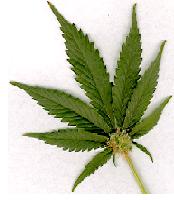EU court
Dutch town right to refuse drug tourism
 A Dutch town was right in refusing to let foreigners buy cannabis, Europe's highest court said in a ruling Thursday that will help the national government's plans to curb sales of the drug to tourists.
A Dutch town was right in refusing to let foreigners buy cannabis, Europe's highest court said in a ruling Thursday that will help the national government's plans to curb sales of the drug to tourists.
The European Court of Justice ruled that the mayor of Maastricht -- a southern town near the German and Belgian borders and not far from France -- was right to close down a coffee shop that had been selling cannabis to non-residents.
"A prohibition on admitting non-residents to coffee shops ... constitutes a measure capable of substantially limiting drug tourism and, consequently, of reducing the problems it causes," the Luxembourg-based court said in its judgment.
The owner of the coffee shop "Easy Going" had asked for a decision taken by the town's mayor in 2005 to stop foreigners buying drugs in the town's cafes to be overturned.
The Dutch government said last month it planned to introduce a similar system nationwide, but a Dutch court still needs to give a final ruling on the Maastricht case next year.
However, Maastricht councillor Manon Fokke said the town was now opposed to a ban on tourists buying cannabis, arguing it would lead to an increase in the illegal trade.
She said Maastricht now wanted to move its coffee shops to the edge of the city, closer to the border, which would improve public safety in the town.
The town's new stance echoes that of the capital Amsterdam, which has also objected to the government's proposed ban on foreigners buying cannabis.
But Wim van der Weegen, a spokesman at the Security and Justice Ministry, said the government was committed to the measure, stressing that the so-called "weed pass" will be introduced nationwide and with no exceptions.
The Netherlands is the only country in the 27-state European Union where soft drug sales are tolerated. Possession of soft drugs for personal use has been decriminalised, and their sale, though prohibited by law, is tolerated in the coffee shops.
Maastricht is a favorite destination for soft drug users, and 70 percent of the town's cannabis sales, worth some 10 million euros ($13.2 million) a year, are made to foreigners in its 14 coffee shops, according to European Court of Justice evidence.
The owner of "Easy Going" had argued the ban violated the principles of the EU's single market, which gives EU citizens equal rights to goods and services. The court admitted that tourists were being deprived of certain EU rights, but nonetheless rejected the argument.
(Published by Reuters - December 16, 2010)